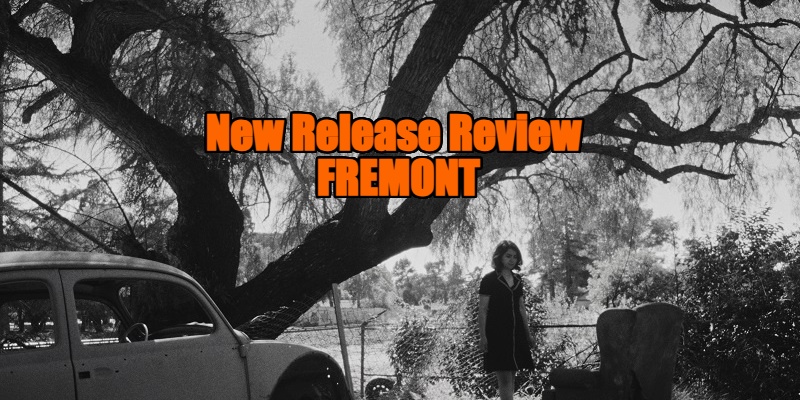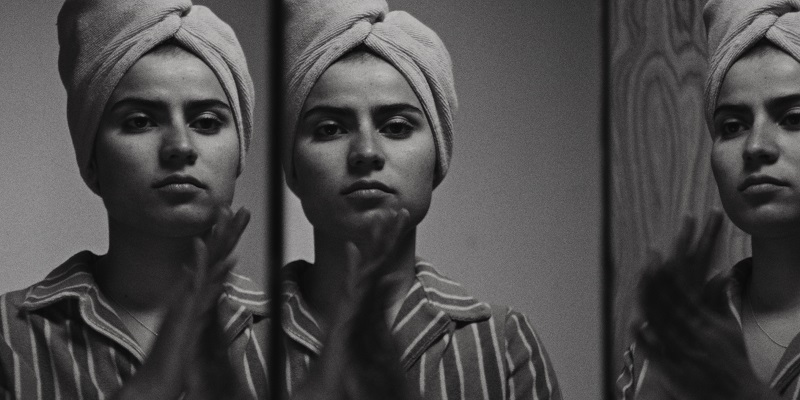
Review by
Benjamin Poole
Directed by: Babak Jalali
Starring: Anaita Wali Zada, Gregg Turkington, Jeremy Allen White

The city doesn't care. Daily, nightly, a populace of millions shift
through its concrete arteries, swallowed up by the glass and steel
shadows its towering constructions throw. We go to the city to complete
a need, but the city only ever anonymises, incapable of acknowledging
our hopes and dreams (a side note; over the summer I rewatched the uber
text of this narrative type, Taxi Driver, and was struck by how congruous Travis - gormless, dangerous,
entitled - is with our modern incel culture: prophetic). In the case of
Babak Jalali's (writing with Carolina Cavalli) really
quite special Fremont, this dream is of an American flavour, with Afghan emigrant Donya (Anaita Wali Zada
- incredible) eking out a meagre existence while working in a factory in
Fremont. It is an ignominious profession following her previously more
vital role as an overseas translator for the U.S. army. Donya is
uncomplaining, yet haunted by her experiences of war, and, as an
immigrant in an anonymous city, alienated and deeply lonely.

Guided by Laura Valladao's monochrome photography,
Fremont's style communicates disaffection in shades of lush pewter and
silvers. We open in the fortune cookie factory where Donya works (the
history of the fortune cookie is an interesting little rabbit hole in
itself and supports Fremont's Americana themes). The heavy machinery, glum faces of the workers,
and rolling mass of produce is far removed from the whimsical magic
implied by a biscuit which can apparently divine fate. To compound the
point, we first see Donya on the fringes of a conversation with workers
about what one would do if they won a million dollars - the most
desolate of all workplace chats. Donya wanders the streets alone. She
visits a pro-bono therapist (I got the sense that he too, like everyone
else, is desperate for connection) for help with her insomnia but who,
wryly played by Gregg Turkington, is not much use at all: in one
of Fremont's most poignant jokes, a session concludes with Donya consoling him
through his tears.
An immigrant to America herself, Wali Zada is incredible in her first
role, and gives the disparate narrative and loose interactions of
Fremont human gravity. With her intense beauty, the camera
loves Wali Zada and, via her portrayal of stoic, relatable Donya, you
will too as she interacts with Fremont's gallery of quirky denizens. There is the friend who offers
knowing-but-pretty-shit-actually dating advice, the
well-meaning-but-patronising boss, his mean-spirited wife. Where do
people go in the city to find actual connections, to make friends, to
find love? When a co-worker drops dead on the job (another of
Fremont's sly, deadpan jokes) Donya is promoted to "fortune writer" for the
cookies, and decides to enclose a personal message along with her phone
number within the baked wafer folds of the confection...

The action has all the promise of a rom-com set up, but
Fremont has no such genre fealty, or interest in narrative
routine. In the initial sequences we are located within the frames of
Prime Indie: that is, the thick black and white mise-en-scene of
Jarmusch or Go Fish (love that film), along with the de
rigueur arch presentation of long-held static shots (an acid jazz score
follows Donya through the neon city streets, and we're back in 1994).
The deliberately nostalgic invocation is a bit like when an
oversaturated contemporary horror film trades off '80s memories, but
Fremont is more sincere than that, and utilises the retro
mode to consolidate its aura of displacement and artful isolation.
Among the picaresque is Donya's Afghan neighbour, who blanks her
throughout, deeming her a traitor in the same way that her home country
people do following her service with the American army.
Fremont presents the immigrant situation, and the empty
wish of the American dream, in ways which are subtle but persistent. We
see this most eloquently through a sweet analogy with White Fang,
Donya's therapist's favourite book and a canon text of American
actualisation: like the eponymous hybrid of the novel, Donya is viewed
with suspicion within her new context, and her supposed kinspeople also
deny her. This conclusive exposition is kept until the end of the second
act, up until which the film has gradually built its imperial sense of
solitude, strange claustrophobia and cultural incongruity in visual
waves of grey/gray.

Could romance come in the kind, teddy bear-like form of mechanic
Jeremy Allen White (a hunk who always looks on the verge
of tears?). If so, then the loneliness which wounds both characters is
assuaged by gentle and simple emotional honesty, forging a bond against
all the odds in the shadows of the city. Although its arty throwback
stylings may initially constern, the connection
Fremont ultimately makes with audiences will last long
after the credits.

Fremont is in UK/ROI cinemas from September 15th.

